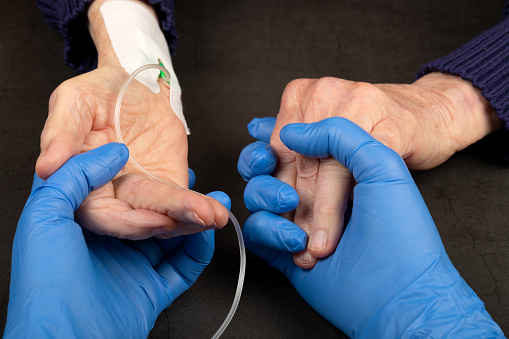It’s been clear for months that the Covid-19 coronavirus was taking an especially heavy toll among older Americans in nursing homes and assisted-living facilities — and on the dedicated workers who care for them.
Now, the data is starting to show just how bad things really are.
The New York Times reported this weekend that 43% of U.S. virus deaths are tied to operations serving the elderly.
“At least 54,000 residents and employees of nursing homes and long-term care facilities have died from the coronavirus,” the Times said, citing its own database.
The Times says it tracked 282,000 known coronavirus cases at some 12,000 facilities, via “reports from states, counties and individual facilities, as well as some data from the federal government.”
Nobody knows this better, or feels the burden more heavily, than nurses, doctors and others (from nursing aides to cooks to janitors) who work in such places — and yet they show up, day after day, often receiving little help, supplies or outside funding.
“More than four months into the pandemic, nursing home caregivers say they have been largely left to fend for themselves even as coronavirus outbreaks continue to overwhelm facilities across the country,” reports the Washington Post.
“The fallout, they say, has been devastating. Tens of thousands of nursing home workers have contracted the coronavirus and at least 200 have died,” the Post says, based on its analysis of state data.
That count of 200 is “probably low,” the Post says, citing likely inaccuracies or undercounting in the reporting.
“In nursing homes with large outbreaks,” the Times says,“about 17% of people with the virus died, compared to about 5% of all known coronavirus patients.”
Adding to the threat, the Post says, “More than 2,100 nursing homes nationwide reported earlier this month that they lack a week’s supply of N95 masks, and 2,200 said they were running short on gowns.”
The Federal Emergency Management Agency (FEMA) promised in April to coordinate shipments of such supplies to be sure each facility had enough to last two weeks.
“But some homes received expired masks, cloth masks possibly made from T-shirts, ill-fitting plastic gowns or partial shipments that would not last a week,” the Post says, quoting Lisa Sanders, a spokeswoman for LeadingAge, which represents nonprofit long-term care providers. The shipments, she said, came in unmarked boxes with no return address.
Even facilities with adequate supplies may be severely understaffed.
“More than 2,200 nursing homes reported earlier this month that they lacked an adequate number of nurses, and 2,600 reported a shortage of nursing aides,” the federal Centers for Medicare and Medicaid Services, which regulates nursing homes, told the Post.



